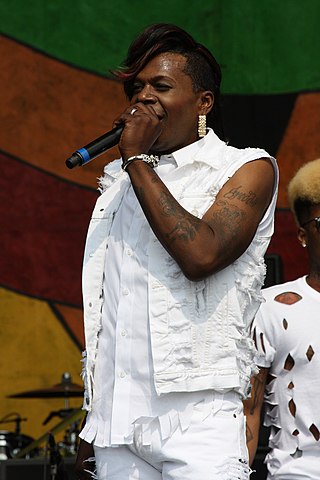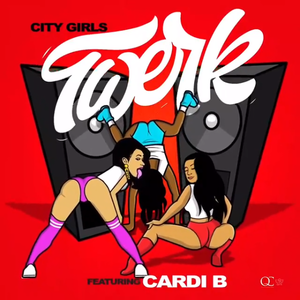Related Research Articles

Terius Gray, better known by his stage name Juvenile, is an American rapper best known for his work with Birdman's Cash Money Records in the late 1990s and early 2000s, both solo and as a member of the label's then-flagship group, Hot Boys.
Southern hip hop, also known as Southern rap, South Coast hip hop, or dirty south, is a blanket term for a regional genre of American hip hop music that emerged in the Southern United States, especially in Georgia, Texas, Louisiana, Tennessee, and Florida—often titled "The Big 5," five states which constitute the "Southern Network" in rap music.

Cash Money Records is an American record label founded in 1991 by brothers Ronald "Slim" Williams and Bryan "Baby" Williams. The label gained prominence in the late 1990s for having signed and released albums for New Orleans–based musical acts including Lil Wayne, Juvenile, B.G., and Hot Boys. It became an imprint of Universal Records, a division of Universal Music Group in March 1998, and remained so during its following iterations as Universal Republic, Universal Motown and ultimately Republic Records.
504 Boyz were an American hip hop group from New Orleans, Louisiana, named for the New Orleans area code.

Bryan Christopher Williams, better known by his stage names Birdman or Baby, is an American rapper and record executive. He is the public face of Cash Money Records, a record label he co-founded with his older brother, Ronald "Slim" Williams, in 1991. Birdman released his eponymous debut studio album in 2002, and released three follow-up albums—Fast Money (2005), 5 * Stunna (2007), and Priceless (2009)—to moderate commercial success and mixed critical reception. Along with his solo career, he is a member of the hip hop duo Big Tymers with producer Mannie Fresh, as well as the supergroup Cash Money Millionaires.

Bounce music is a style of New Orleans hip hop music that is said to have originated as early as the late 1980s in the city's housing projects. Popular bounce artists have included DJ Jubilee, Partners-N-Crime, Magnolia Shorty and Big Freedia.

"Back That Azz Up", also known as "Back That Thang Up" for a radio edit, is a song recorded by American rapper Juvenile featuring fellow American rappers Mannie Fresh and Lil Wayne. Produced by Fresh, it was released on June 11, 1999, as the second single from Juvenile's 1998 album 400 Degreez. The song was Juvenile's biggest hit single at the time until the chart-topping "Slow Motion" in 2004, surpassing "Back That Azz Up" which peaked at number 19 on the Billboard Hot 100.
Take Fo' Records is an independent record label from New Orleans and the first to specialize in bounce music. The label is a subsidiary of Positive Black Talk, Inc., was founded in 1992 and operated by creative duo Earl J. Mackie and Henry F. Holden, until 2005. Prior to creating the record label, the duo teamed up to produce a cable access television program called Positive Black Talk, aiming at positive African American leadership in the New Orleans community. The television show changed its name to PBT and was later hosted by Mackie's younger cousin, Anthony Mackie, who was a student at NOCCA at the time. "It was just a 15-year-old black dude acting a fool," Anthony says of the early endeavor. After holding a fundraising concert for the program, Earl Mackie and Holden became intrigued by the music industry, so they decided to put together a girl group called Da' Sha Ra'. The newly formed group appeared frequently on the television program.

Bobby Marchan was an American rhythm and blues singer, songwriter, recording artist, bandleader, MC, and female impersonator. He was the key singer in the early lineup of Huey "Piano" Smith and His Clowns along with Gerri Hall and Roosevelt Wright.

Byron Otto Thomas, better known by his stage name Mannie Fresh, is an American record producer, DJ and rapper from New Orleans, Louisiana. He is best known for his production work for Cash Money Records releases, as well being half of the hip hop duo Big Tymers with the label's co-founder, Birdman.

Renetta Yemika Lowe-Bridgewater, known by the stage name Magnolia Shorty, was an American rapper in the New Orleans–based bounce music scene.

Freddie Ross Jr., better known by his stage name Big Freedia, is an American rapper and performer known for his work in the New Orleans genre of hip hop called bounce music. Freedia has been credited with helping popularize the genre, which had been largely underground since developing in the early 1990s.

Twerking is a type of dance to popular music in a sexually provocative manner involving throwing or thrusting the hips back or shaking the buttocks, often in a low squatting stance. It is individually performed chiefly but not exclusively by women.

"Before I Let Go" is a song performed by American R&B band Maze, issued as the second single from the band's fifth album and first live album Live in New Orleans. Although Live in New Orleans is a live album, "Before I Let Go" appears on the album as a studio recording. Written and produced by lead singer Frankie Beverly, the song peaked at #13 on the Billboard R&B chart in 1981. The song has been noted for its enduring popularity in Black American culture as a staple of gatherings and parties.

Suzannah Elizabeth Powell is an American singer, songwriter, producer, rapper, and performance artist, best known by her stage name Boyfriend. Raised in Nashville, she found her persona upon moving to New Orleans. Boyfriend coined the term "rap-cabaret", a nod to the emphasis on performance in her music.

Nickesse Trimaine Toney, known by his stage name Nicky Da B, was an American rapper specializing in the regional genre of bounce music. He released an album in 2012 titled Please Don't Forget Da B, and his single with the artist Diplo that year, Express Yourself, was one of the year's largest viral successes, featuring in a Doritos commercial during Super Bowl XLVII. He was also known for his role in popularizing the dance phenomenon of twerking.
The Triggerman beat, also known as Triggaman, is a one-bar drum loop that originated from sampling "Drag Rap" by the Showboys and "Brown Beats" by Cameron Paul. The one-bar drum loop and bells was known to be used in bounce music, having been used in hundreds of records. The beat has been influential in recent hip hop music, including Juvenile's "Back That Azz Up", David Banner's "Like a Pimp", T.I. and Lil Wayne's "Ball", Drake's "Nice for What" and "In My Feelings", and also "Go Crazy" by Chris Brown and Young Thug.
Katey Red is a bounce artist and M.C. from New Orleans. Red is most known for being one of the first transgender rappers in bounce music and is credited with creating the sissy bounce genre.

"Twerk" is a song by American hip hop duo City Girls featuring American rapper Cardi B, from the duo's debut album Girl Code (2018). It was released to US rhythmic contemporary radio on January 8, 2019, as the album's lead single. Filmed in Miami, the song's music video was released the same month. "Twerk" is a New Orleans bounce-inspired song, which heavily samples Choppa's "Choppa Style". It also samples the popular Triggerman beat, which is prominent among the New Orleans bounce scene. It peaked at number 29 on the US Billboard Hot 100 chart and was certified Platinum by the Recording Industry Association of America (RIAA).

"Wobble Up" is a song by American singer Chris Brown featuring Trinidadian-born rapper Nicki Minaj and American rapper G-Eazy. "Wobble Up" is a bounce track, and its production samples “Monkey on the D$ck” (1996), originally produced by Mannie Fresh and performed by Cash Money Records’ artist Magnolia Shorty. “Wobble Up” was released on April 18, 2019, as the third single from Brown's ninth studio album Indigo.
References
- 1 2 3 4 5 6 7 8 9 lion, wizzy. "DJ Jubilee - Biography". valley Music. Retrieved December 9, 2017.
- ↑ Journet, Brandon (September 4, 2013). "Was DJ Jubilee The First Person To Ever Say 'Twerk' In 1993?" . Retrieved May 21, 2023.
- ↑ Cortello, Karen (June 1, 1998). "DJ Jubilee". OffBeat Magazine. Retrieved December 9, 2013.
- ↑ Rawls, Alex (November 22, 2013). "New Orleans hip-hop goes to Preservation Hall with 'acoustic bounce' show". The New Orleans Advocate. Archived from the original on March 4, 2016. Retrieved December 9, 2013.
- ↑ Fensterstock, Alison (November 24, 2013). "DJ Jubilee had Preservation Hall backing that thing up, right into the history books". The New Orleans Times-Picayune. Retrieved December 9, 2013.
- ↑ Neil Strauss, "A Trendsetter On Rap's Fringe", The New York Times , May 28, 2000.
- ↑ Positive Black Talk, Inc. v. Cash Money Records, Inc., 394F.3d357 (5th Cir.December 17, 2004).
- ↑ "Meet the twerking-class deejay who jump-started the N.O. Dance trend".